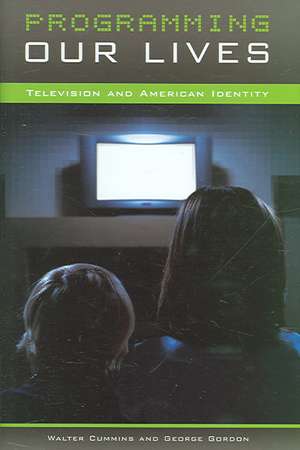Programming Our Lives: Television and American Identity
Autor Walter Cummins, George Gordonen Limba Engleză Hardback – 29 iun 2006 – vârsta până la 17 ani
Preț: 322.40 lei
Preț vechi: 392.47 lei
-18% Nou
Puncte Express: 484
Preț estimativ în valută:
61.69€ • 64.58$ • 51.05£
61.69€ • 64.58$ • 51.05£
Carte tipărită la comandă
Livrare economică 05-19 aprilie
Preluare comenzi: 021 569.72.76
Specificații
ISBN-13: 9780275990206
ISBN-10: 0275990206
Pagini: 240
Dimensiuni: 156 x 235 x 25 mm
Greutate: 0.54 kg
Editura: Bloomsbury Publishing
Colecția Praeger
Locul publicării:New York, United States
ISBN-10: 0275990206
Pagini: 240
Dimensiuni: 156 x 235 x 25 mm
Greutate: 0.54 kg
Editura: Bloomsbury Publishing
Colecția Praeger
Locul publicării:New York, United States
Notă biografică
Walter Cummins is Professor Emeritus of English at Farleigh Dickinson University's College at Florham, and Editor Emeritus for The Literary Review: An International Journal of Contemporary Writing. He is the co-author of The Literary Traveler with Thomas E. Kennedy, and the author of the story collections Witness and Where We Live. He serves on the editorial boards of Web Del Sol, Tiferet magazine, and the Fairleigh Dickinson University Press.George Gordon has pursued a distinguished career as a partner of Hay Management Consultants, and president of its Research for Management Division. He was also a member of the faculty of Rutgers University, and a board member of a number of organizations. Over 50 of his articles and speeches have appeared in numerous business magazines, professional publications and books. These span such publications as Academy of Management Review, Directors and Boards, Research-Technology Management, and International Journal of Business. His previous book, Managing Management Climate, was co- authored with Walter Cummins.
Cuprins
PrefaceIntroduction: The Dominant MediumPart I: Our Personal LivesChapter 1: Pictures in Our Heads: "Watching" RadioChapter 2: Learning to Watch: TV and PerceptionChapter 3: Watching Together or Alone: Uniting and DividingChapter 4: Mainstreaming: How TV Creates NormsChapter 5: Amateurs Performing: "Reality" TelevisionChapter 6: Airing Our Lives: Broadcast RevelationsChapter 7: The Price of Admission: CommercialsPart II: Our DemocracyChapter 8: Staggering Costs: TV and ElectionsChapter 9: Pressure through Pictures: Governing and TVChapter 10: Bleeding Leads: News DisseminationPart III: Our SocietyChapter 11: Learning from the Screen:Television and EducationChapter 12: Doctors and Patients: Television and MedicineChapter 13: Criminal Justice: Television and the LawChapter 14: Financing the Game: TV and Professional SportsPart IV: Our WorldChapter 15: Broadcast Cultures: TV in the WorldChapter 16: Multiplying Channels: Proliferation and FragmentationChapter 17: Nothing Out of Range: The Prevalence of TV CamerasChapter 18: The Future of TV: Technology, Content, EffectsConclusionChapter 19: American Life after Sixty Years of TVReferencesIndex
Recenzii
Television has become such an everyday presence in contemporary America that most people take it for granted, rarely considering the role it has played in the ways society has changed in the past 60 years, according to Cummins and Gordon, a management consultant. They investigate television's impact on American news media, politics, and education; on attitudes toward law, crime, medicine, and sports; and on social interaction and perceptions. By shedding light on television's influence and suggesting ways to be more sophisticated viewers, the authors aim to encourage readers to be more effective parents, consumers, voters, and citizens.















